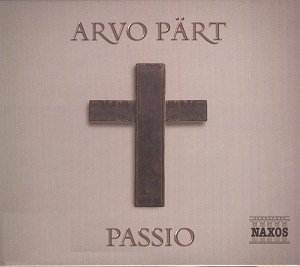Almost all the best recordings of Pärt's music
have involved either the composer himself (as advisor rather than performer)
or people who know or have at least interviewed/spoken with him. This
superb first budget version of the Passio is no exception and
I realised, even before listening, when I read Antony Pitts’ notes that
I was about to hear a great interpretation. Pitts, who directs his Tonus
Peregrinus ("wandering tone") group with a vision that recalls that
of his producer Jeremy Summerly's excellent discs for the same label
with the Oxford Camerata, interviewed Pärt for BBC Radio 3 in 2000.
Like Paul Hillier before him, he has an acute awareness of what Pärt
is about, musically speaking, and this could be one of Naxos's most
important releases to date. The original recording, released as long
as fourteen years ago, on ECM, the visionary German label (Manfred Eicher,
the label's founder, and Pärt are very close, artistically), is
a classic but there are things here that do tangibly improve upon it.
For example, Pitts' ensemble knocks almost ten minutes off the playing
time and, for some listeners, a slightly more animated version of what
can sometimes be very static, still music may be an attraction. Also,
the ECM disc had no cue points at all; nothing wrong in the sense that
it is an integrated whole but not everyone can listen for an hour at
a stretch unbroken. Helpfully, the new release provides four tracks,
although, no doubt in deference to the composer's artistic wishes, we
are told that these are for our convenience only.
The wonderful Gidon Kremer/Keith Jarrett Fratres
LP (also ECM) was my introduction to Pärt in the 1980s. I have
followed his development with interest, although not always total satisfaction,
ever since. My main preference remains for his earlier, although post-serial
"tinntinabuli" instrumental music. One or two of his piano miniatures
have come to mean a great deal; some of his vocal/choral pieces I can
take or leave but Passio is not one of them. In fact it owes
a great deal to the aforementioned "tinntinabuli" principle (Pärt's
arguably most famous/performed work Cantus in Memory of Benjamin
Britten is a perfect example of this). It is spare, austere, some
would say repetitive but, filtered through Schütz, late Stravinsky
and, I suppose, Bach, it is music in which, unusually, extreme clarity
and intense emotion are not diametrically opposed. Its hieratic atmosphere,
so ideally captured on the original ECM disc and hardly less so here,
is never totally cold. It bleeds deep spirituality, much more so than
some of the later works (Berliner Messe?) and those of the often
compared John Tavener. In Passio, of which this is the first
recording to take note of Pärt's recent clarifications (rather
than revisions), the composer "eschews all word-painting and mood-setting"
and "returns to the neutrality of the Latin translation", i.e. everything
is pared down to the basics, there is neither room nor need for any
floridity. A lot of Pärt's music is beyond words, beyond description
and this is more so than most - just buy the disc, it will cost you
£5, although if you also buy a disc of the orchestral works first
you may find it an easier entry point into his world (try the previous
Naxos disc (3rd symphony etc.) or Tasmin Little/Martin Roscoe
on HMV/CFP).
Passio is, in conclusion, music that takes us
far beyond everyday mundanities, to the true meaning of life (and death).
It is music that is of our time but also out of time (timeless?). You
ought to hear it and Antony Pitts has provided you with the perfect
opportunity. Perhaps if our supposedly religiously motivated leaders
listened to this tonight they may act differently tomorrow. I wish.
The still, small voice continues to be drowned out …
Neil Horner
